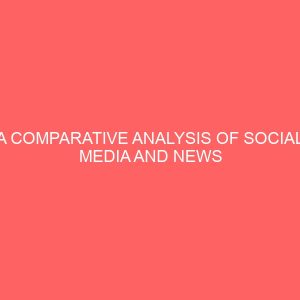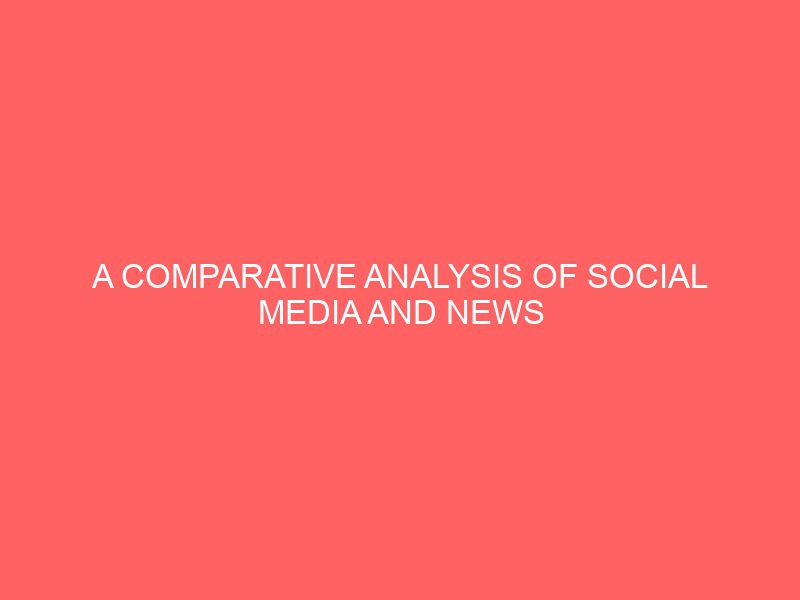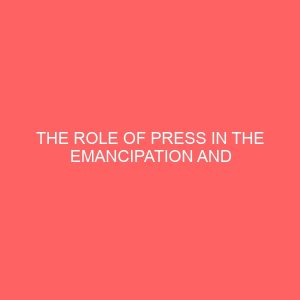Description
Abstract
The advent of social media as a news platform and its patronage daily by people to know what is happening around them has elicited several comparative studies on the news credibility on social media, television and newspapers. This study conducted a comparative investigation of the news credibility of social media, television and newspapers. The study in its research design used both focus group discussion and the survey method. The researcher employed source effects model as the theoretical framework for the study. Findings of the research revealed that level of education and knowledge of internet have influence on the selection and believability of news by respondents. Likewise, most people rely on another media after their exposure to their preferred choice of media in other to authenticate the truthfulness of a news story. The study also revealed that those who placed television and newspaper news as higher on the credibility scale than the social media did so because news in the newspapers and on television are produced by well trained personnel and there are institutionalized ways of filtering news stories to ensure their accuracy and objectivity.
1.1.Introduction
Every day people receive information that is far more than they can possibly use. Information from the mass media, friends, books and lately the internet influences people in their decision making process and their perceptions of event and happenings around them. The mass media particularly has become an important organ through which people make meaning out of their lives, social activities and issues within the society.
People regularly stay glue to their television and radio set for information and flock the newspaper and magazine stands for same purpose. Even, in a situation where information is spread around in a society; it does not carry any iota of credibility until such information is confirmed by the media. For several decades, the mass media especially television, radio, newspaper and magazines has been a major source of information dissemination such that it assumed the pivotal role of the fourth estate of the realm and also, a societal watchdog.
The news content of the media especially in developing countries like Nigeria where the government at both state and federal levels dominates ownership has been dogged by questions like whether the news content is accurate and true or a reflection of the government position. Similarly, the private media organizations do not fair better as market compulsions and profit making objectives raise such pertinent questions like whether the media should be accountable to private interests or the society. This has continued to generate controversies and arguments about the blurred distinctions between news and views, news and advertisements and propaganda and information. Also, profit motives and ownership often influence news managers to manipulate content Bakshi and Mishra, 2010. This therefore makes the credibility of media content a concern especially with the mass of information that is available daily for consumption.
In recent years, new communication technology and the rise of the internet have opened up a new vista of information dissemination that has never been experienced before. It, especially the internet, has penetrated peoples daily lives in ways that hitherto are unimaginable. According to Fogg et al 2001, the growth of the internet since the 1980s has been faster than the growth of any other communication medium. The emergence of a new medium often affects existing media Liu, 2003 in several ways such as audience base, credibility and production process. The internet provides an alternative space for expression by citizens against the limited access provided by the mainstream media of television, radio and newspaper where length of freedom and space are determined by the government and/or ownership interest. The news media has transformed people from being passive and at the receiving end of one way mass communication to becoming producers and transmitters of information Creeber and Martin, 2009; Bennett, 2003. With this phenomenon, the internet and the news media have assumed great importance and popularity in the society as people are free to create their own news comment on issues and get the other side of a story Rosenstiel, 2005.
As the new media platforms assume an important source of information dissemination and expression of opinion, the level to which people place trust and credibility in both the mainstream media and the news media becomes an issue of concern and investigation. It is not all information that is useful and credible and this explains Griffin 2009s argument of source credibility as one of the three major ways through which speakers convince audience members.
Against this background therefore, the aim of this study is to investigate the perception of the news credibility of social media, television and newspapers.








Reviews
There are no reviews yet.